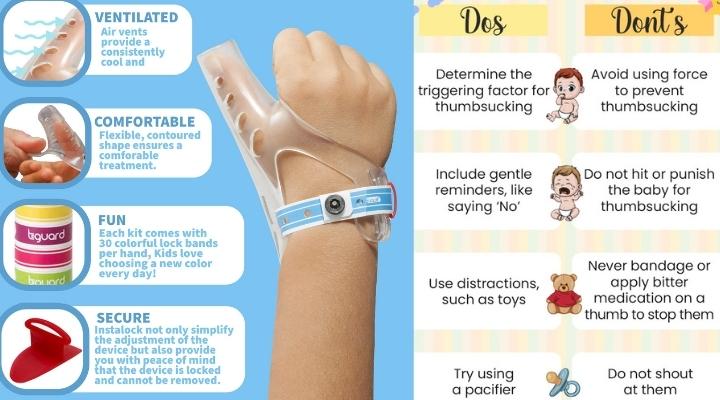6 Ways to Stop Your Babies from Thumb-sucking
Thumb sucking is a common habit among babies and young children. It is a natural reflex that helps infants soothe themselves and find comfort during the early stages of life. In this article, we will explore 6 Ways to Stop Your Babies from Thumb-sucking and encourage their positive behaviors. However, prolonged thumb sucking can lead to dental and speech issues, as well as potential social concerns as the child grows older. As parents, it is essential to gently guide our children away from this habit and promote healthier coping mechanisms.
6 Ways to Stop Your Babies from Thumb-sucking
Understand the Root Cause
The first step in addressing thumb sucking is to understand the underlying cause. Many babies start thumb-sucking in infancy as a way to self-soothe, particularly when they are hungry, tired, or anxious. For some, it may become a habit they rely on even when there’s no specific trigger. Identifying the reasons behind thumb sucking can help you determine the appropriate approach to tackle the habit.
If thumb sucking is primarily a self-comfort mechanism, focus on providing alternative soothing methods. Offering a pacifier or a soft blanket can be helpful substitutes. For older babies, engage them in playful activities or provide toys that keep their hands occupied.
Related- 6 Healthy & Tasty Breakfasts For Your Kids- You Must Know
1. Create a Positive Environment-
The first step in helping your baby stop thumb-sucking is to create a positive and nurturing environment. Avoid negative reinforcement or punishment as this may lead to anxiety and worsen the thumb-sucking habit. Instead, focus on praise and encouragement when your baby refrains from thumb-sucking. Offer verbal affirmations and use a reward system, such as a sticker chart, where your child can track their progress and earn small rewards for staying thumb-free for a set period.
Related- 10 Good Habits For Children- Parents Should Teach
2. Identify Triggers-
Understanding the triggers that prompt thumb-sucking can help address the root cause of the behavior. Babies often resort to thumb-sucking when they feel bored, tired, anxious, or in need of comfort. Pay close attention to situations or environments that encourage this habit, and try to redirect their attention to other soothing activities. Engage your baby in games, storytelling, or playing with toys to keep their hands and mind occupied.
3. Substitute with Pacifiers or Comfort Objects-
Introducing a pacifier or a comfort object can be an effective way to wean your baby off thumb-sucking. Pacifiers provide the same comfort and sucking action while being easier to control and eventually take away. However, be mindful not to let pacifier use continue for too long, as it can lead to dental issues if used excessively.
Another option is to provide your baby with a soft and cuddly comfort object, like a blanket or a stuffed toy. Having a physical object to hold onto can reduce the need for thumb-sucking and offer a sense of security.
4. Establish a Consistent Routine-
Consistency is key when trying to break any habit, including thumb-sucking. Establish a consistent daily routine for your baby, including mealtimes, playtime, nap times, and bedtime. Predictable schedules can help provide a sense of security and stability for your child, reducing their reliance on thumb-sucking as a coping mechanism.
During stressful or unfamiliar situations, such as meeting new people or going to unfamiliar places, offer extra comfort and reassurance. Your presence and a familiar routine will act as a security blanket, making them less likely to seek comfort through thumb-sucking.
Also check- 10 Very Simple Art And Craft Ideas For Babies
5. Use Thumb Guards or Bitter-Tasting Solutions-
Thumb guards are designed to make thumb sucking less satisfying by covering the thumb with a soft, non-toxic material that makes it less enjoyable to suck on. These guards are gentle and do not cause discomfort or pain. They act as a physical reminder for the child to refrain from thumb-sucking, and over time, the habit may naturally fade away.
Alternatively, you can use bitter-tasting solutions that are safe for children but unpleasant to taste. Apply this solution to your child’s thumb, and when they attempt to suck it, they’ll associate the unpleasant taste with the action, gradually deterring them from continuing the habit.
6. Be Patient and Understanding-
Breaking a habit takes time, and it is essential to be patient and understanding throughout the process. Avoid using negative reinforcement or shaming your child for thumb-sucking, as this can lead to emotional distress and may even exacerbate the habit.
Understand that thumb-sucking is often a response to emotions or needs, and your child may require additional support during challenging times. Offer comfort and love, even if they occasionally resort to thumb-sucking, as creating a nurturing environment will ultimately help them overcome the habit with greater success.
Thumb sucking is a common and natural behavior in babies and young children, but it’s essential to address it if it persists beyond a certain age. By creating a positive environment, identifying triggers, introducing pacifiers or comfort objects, establishing a consistent routine, using bitter-tasting nail polish, and involving your child in the process, you can effectively help your baby stop thumb-sucking. Remember, breaking a habit takes time and patience, so be gentle and supportive throughout the journey. If you encounter any challenges or have concerns, consult your pediatrician for additional guidance. Helping your baby overcome thumb sucking will not only promote their oral health but also contribute to their overall development and well-being.
Frequently Asked Questions-
At what age should I start trying to stop my baby from thumb-sucking?
The ideal time to begin addressing thumb sucking varies from child to child, but most experts recommend waiting until around age 3 or 4. At this age, children are more likely to understand and respond to explanations about why they should stop. However, some children naturally outgrow the habit on their own, while others might need assistance as early as age 2. It’s essential to strike a balance between addressing the habit and not pressuring your child too soon, as this can lead to anxiety and resistance.
Is thumb-sucking harmful, and why should I be concerned about it?
Thumb sucking is generally harmless in infants and very young children. It’s a natural way for them to self-soothe and find comfort. However, prolonged thumb sucking can lead to dental problems, such as misalignment of the teeth or an overbite. It can also impact speech development and potentially lead to social challenges if the child is teased by peers. While it’s essential to address thumb sucking, it’s equally important to do so in a gentle and understanding manner.
What are some gentle strategies I can use to help my baby stop thumb-sucking?
There are several gentle strategies you can employ to help your baby stop thumb-sucking:
- Positive reinforcement- Offer praise and rewards when your child refrains from thumb-sucking. Use a sticker chart or a small reward system to encourage their progress.
- Distraction- Engage your child in activities that keep their hands and mind occupied, such as playing games, drawing, or reading stories.
- Comfort objects- Introduce a pacifier or a soft toy as an alternative source of comfort. These objects can be easier to control and eventually remove.
- Open communication- Have age-appropriate conversations with your child about why it’s important to stop thumb-sucking. Involve them in the decision-making process to increase their cooperation.
What if my child is resistant to stopping thumb-sucking?
It’s not uncommon for children to be resistant to giving up thumb sucking, especially if it has been a long-standing habit. Here are some tips for handling resistance:
- Be patient- Understand that breaking a habit takes time and effort. Avoid pressuring or scolding your child, as this can lead to stress and worsen the habit.
- Empathy- Acknowledge your child’s feelings and reassure them that you’re there to support them. Let them know that you understand thumb-sucking provides comfort, but it’s important to work together to find healthier alternatives.
- Set achievable goals- Break the process into small steps and celebrate even minor victories. Gradually decrease the time allowed for thumb sucking to help your child adjust.
When should I seek professional help for my child’s thumb-sucking?
In most cases, thumb sucking can be addressed using gentle strategies at home. However, if your child’s thumb sucking is causing significant dental issues, speech problems, or emotional distress, it might be time to consult a pediatric dentist, orthodontist, or pediatrician. These professionals can provide specialized guidance and recommendations based on your child’s specific needs. If your child continues thumb-sucking despite your best efforts, professional advice can offer additional insights and support.










